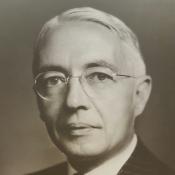Percival Flack Brundage
 The son of William Mifton and Charlotte Flack Brundage was born April 2, 1892, in Amsterdam, New York. He attended preparatory schools in Albany, New York - Albany Boy's Academy; and Brooklyn, New York - Adelphi Academy, graduating in 1910. His father was a Methodist minister before becoming a Unitarian minister. He graduated cum laude from Harvard University in 1914. In 1950 he received the honorary Doctor of Commercial Science degree from New York University. He was certified as a CPA in 1919 (New Jersey).
The son of William Mifton and Charlotte Flack Brundage was born April 2, 1892, in Amsterdam, New York. He attended preparatory schools in Albany, New York - Albany Boy's Academy; and Brooklyn, New York - Adelphi Academy, graduating in 1910. His father was a Methodist minister before becoming a Unitarian minister. He graduated cum laude from Harvard University in 1914. In 1950 he received the honorary Doctor of Commercial Science degree from New York University. He was certified as a CPA in 1919 (New Jersey).
Following graduation, he joined the accounting firm of Patterson & Ridgway (1914) in New York City, serving first as an office boy, then as a junior accountant, and later as a senior accountant. In 1916 he resigned to join Price Waterhouse & Co. During World War I, he accepted a civilian appointment in charge of the Material Accounting Section of the New York Depot Quartermaster's Office. He returned to Price Waterhouse & Co. in 1918, was made a partner in 1930 and a senior partner in 1944, the position he held until 1954. He then left the firm to become Deputy Director of the Bureau of the Budget (1954). In 1956, he became Director of the Bureau of the Budget, the position he held until retirement (1958). After retiring, he continued with the Bureau in an advisory position for two years (1958-60) to complete some projects. He was the first CPA to hold these positions in the federal government.
He was active in several professional organizations, in particular the AICPA, serving as its president (1948-49) after having been vice president (1946-47). He was also a member of the AICPA's Council (1943-46; 1947-48), Executive Committee (1943-49; chairman 1949-50), Board of Examiners (1935-40), and Trial Board (1950-59). In addition he served on many of its committees including the Committee on Auditing Procedure (1940-43). As chairman (1949-52) of the study group on business income sponsored by the AICPA and the Rockefeller Foundation, he edged the study group's published report, Changing Concepts of Business Income (1952). He was co-chairman of the National Conference of Lawyers and CPAs during 1950-53. He was also active in the Massachusetts Society of CPAS, serving as its president (1931-32), vice president (1930-31), and as a director at different periods. He was a vice president (1945-46) and first vice president (1947-48) of the New York State Society of CPAs and he was also affiliated with the New Jersey Society of CPAs. He was the Dickinson Lecturer (1950-51) at Harvard and a lecturer at Oxford University (1946). He authored numerous articles for professional journals and also The Bureau of the Budget(1970). In 1952 he received the AICPA's Gold Medal Award. He was the 1947-48 recipient of the Distinguished Service Award given by the New York State Society of CPAs.
His activities in government, civic, and community services are numerous. He was director (1940-54) and chairman (1951-54) of Federal Union, Inc., which advocates federation of the Atlantic democracies. He was also treasurer of the International Movement for Atlantic Union, which was affiliated with Federal Union, Inc. He was director, American Christian Committee for Refugees (1938); director, American Relief for Austria; chairman of the board, Refugee Relief Trustees; president, Friends of Albert Schweftzer College (1953-58); and president, Society of Business Advisory Professions. He was active in the National Bureau of Economic Research, serving as president (1954), vice president (1952; 1953), director (1943-66), and director emeritus from 1967 until his death. He was also chairman of the Executive Committee of the New York Chamber of Commerce (1952-54) and director, Montclair Community Chest (1950-54). He was an honorary president of the American Youth Hostels. An active member in church and charitable organizations, he was director of the American Unitarian Association (1942-48) and in 1949 began the first of five years as a director of the Unitarian Service Committee (1949-54). He was president, International Association for Liberal Christianity and Religious Freedom (1952-55); and chairman, Unitarian Development Fund Campaign (1959-62). He served as treasurer and director of the Atlantic Council of the United States and Project HOPE (the People-to-People Health Foundation).
He was married to Amittai Ostrander on June 1, 1918; they had two children. An amateur artist of distinction, he enjoyed folk dancing, farming, and outdoor sports; particularly tennis, golf, and mountain climbing. He died July 16, 1979 at the age of 87.
 The son of William Mifton and Charlotte Flack Brundage was born April 2, 1892, in Amsterdam, New York. He attended preparatory schools in Albany, New York - Albany Boy's Academy; and Brooklyn, New York - Adelphi Academy, graduating in 1910. His father was a Methodist minister before becoming a Unitarian minister. He graduated cum laude from Harvard University in 1914. In 1950 he received the honorary Doctor of Commercial Science degree from New York University. He was certified as a CPA in 1919 (New Jersey).
The son of William Mifton and Charlotte Flack Brundage was born April 2, 1892, in Amsterdam, New York. He attended preparatory schools in Albany, New York - Albany Boy's Academy; and Brooklyn, New York - Adelphi Academy, graduating in 1910. His father was a Methodist minister before becoming a Unitarian minister. He graduated cum laude from Harvard University in 1914. In 1950 he received the honorary Doctor of Commercial Science degree from New York University. He was certified as a CPA in 1919 (New Jersey).